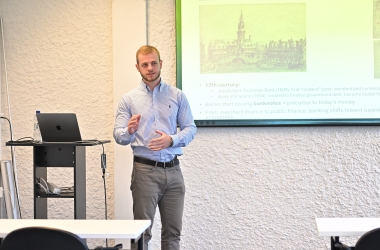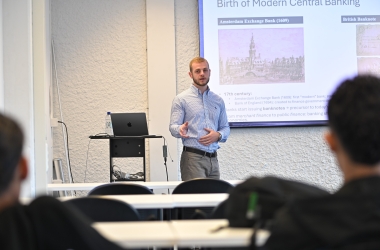Guest Lecture Explores Banking’s Vital Role in the Global Economy

Wittenborg Alumnus Aleksandre Meparidze on Money and Banking
Wittenborg University of Applied Sciences recently welcomed alumnus Aleksandre Meparidze for an engaging guest lecture on 'Money and Banking' for students following the BBA Pathway in International Business Administration (IBA).
Meparidze, a finance professional with extensive experience in banking and investments, currently leads a division at Liberty Bank, Georgia’s third-largest financial institution, where he oversees financial analysis, profitability and strategic projects including mergers and acquisitions. As a CFA Charterholder, he brings a deep understanding of financial markets, banking operations and investment strategies.
Understanding Money and Banking
During his lecture, Meparidze explored a wide range of topics under the theme Money and Banking. “My lecture covered historical forms of banking and early financial systems, the role of banks in the economy, core banking functions, banking regulations, the role of central banks, and future trends and innovations,” he explained. The session also included an in-depth look at banking crises and collapses, with a particular focus on the Silicon Valley Bank (SVB) failure.
Why Banking Matters
Speaking about the relevance of the topic, Meparidze noted, “Banks are at the core of every modern economy. Understanding how they emerged, how they operate and how they are regulated helps students grasp both the opportunities and the risks within financial systems.” He added that with recent crises such as the SVB collapse, “it is especially important to connect theory with real-world events, showing how banking impacts businesses, households and overall economic stability.”
Lessons from Financial Crises
A significant part of the lecture was devoted to examining the 2008 Global Financial Crisis, which was triggered by the US housing bubble and risky mortgage lending. Students learned how financial institutions packaged these risky loans into securities that were sold globally, leading to widespread losses and recession.
“The key message I wanted to convey,” said Meparidze, “is that banking is not just about moving money, it is a cornerstone of economic stability and growth, but also a sector vulnerable to risk and disruption. By understanding both its foundations and its future challenges, students can better appreciate the importance of strong regulation, innovation and critical thinking in finance.”

The Silicon Valley Bank Case
Students then engaged with a case study on Silicon Valley Bank, analysing its balance sheet and depositor structure to understand how concentrated client bases and rising interest rates contributed to its collapse. They participated in group discussions, taking on the roles of startup CFOs, bank managers and regulators to explore the dilemmas faced during a financial crisis.
“The interaction was engaging and dynamic,” Meparidze reflected. “Students asked thoughtful questions throughout the lecture, especially around banking crises and the SVB case study. I encouraged discussion and critical thinking, which led to an active exchange of ideas rather than a one-way presentation.”
One particularly insightful question came from a student who asked about the connection between central bank policy rates and their influence on inflation and currency depreciation or appreciation. “This led to a thoughtful discussion on how monetary policy decisions ripple through the broader economy,” he said.
Looking Ahead: The Future of Banking
In the final part of the session, Meparidze explored key forces shaping the future of banking, including digital transformation, artificial intelligence, blockchain and the rise of fintech and neobanks. He highlighted opportunities such as financial inclusion, embedded finance and green investment, alongside challenges like social media–driven bank runs and cyber risks.
When asked what advice he would offer to students aspiring to work in finance, he said, “Stay curious and build a strong foundation in both economic theory and practical financial skills. Follow real-world events closely, such as banking crises or innovations like fintech and digital currencies, because they bring textbook concepts to life. Finally, develop critical thinking and adaptability, since the financial sector is constantly evolving and rewards those who can connect theory with practice.”
WUP 07/11/2025
by Erene Roux
©WUAS Press